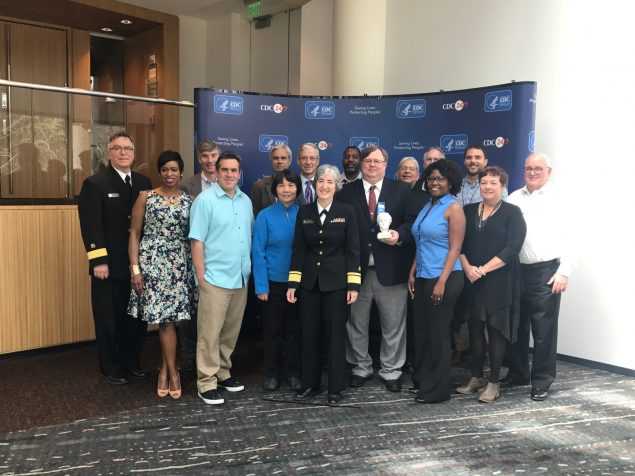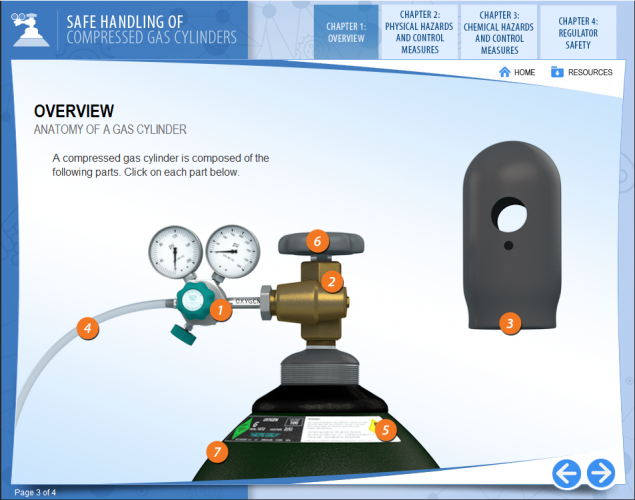Training and Workforce Development Programs for Public Health and Clinical Laboratories
Laboratories across the nation play a critical role in advancing public health and clinical laboratory science. The Division of Laboratory Systems (DLS), in the Center for Surveillance, Epidemiology, and Laboratory Services, is one of many programs across CDC that help train the nation’s laboratory professionals. DLS works to introduce new techniques, training methods, and technologies for laboratory systems – quality and safety, informatics and data science, and workforce development – to help laboratory professionals conduct diagnostic tests, rapidly identify public health threats, and improve surveillance and outbreak responses.
In 2016, DLS successfully worked with more than 30 different CDC programs to develop and deliver over 300 training courses. The courses cover 100 different laboratory training topics and were delivered to more than 20,000 scientists in all 50 states and in over 50 countries. On average, 92% of training participants were able to apply the knowledge and skills gained in training to their own laboratory practices.
CDC at Forefront of Laboratory Safety, Quality, and Preparedness

CDC Laboratory Training Collaborative received the 2016 Honor Award for the development of laboratory safety courses.
The CDC Laboratory Training Collaborative received a 2016 CDC Honor Award for the development of 14 competency-, evidence-, and scenario-based laboratory safety courses for CDC staff. DLS and CDC’s Office of the Associate Director for Laboratory Science and Safety (OADLSS) collaborated closely to develop these courses. These new safety courses have an impact that extends beyond CDC, as they were made available to other U.S. Department of Health and Human Services agencies, such as the Food and Drug Administration and the National Institutes of Health.
Building on this success, in the future, the following laboratory safety courses will be made available for all U.S. clinical and public health laboratories:
- Fundamentals of Working Safely in a Biological Safety Cabinet
- Fundamentals of Working Safely in a Chemical Fume Hood
- Fundamentals of Centrifuge Safety
- Basic Laboratory Personal Protective Equipment
- Respirator Training
- Safe Handling of Compressed Gas Cylinders
- Cryogenic Safety
- And more to come….
DLS Director, Reynolds Salerno, PhD, highlighted the accomplishments of the CDC Laboratory Safety Training Board in strengthening the culture of safety. He stated, “The CDC staff and leadership who developed these courses deserve high praise for their amazing effort and consistent dedication that brought about the development and the release of these laboratory safety training courses for CDC laboratories. Their work reflects both their unique abilities and insights for best practices in laboratory safety, but also their commitment to strengthening the culture of safety at CDC.”
Not only is DLS coordinating with OADLSS on the development of laboratory safety training courses and adapting these trainings for public health and clinical laboratories outside of CDC, DLS and OADLSS will develop and deliver laboratory quality management system training courses collaboratively in the future. These courses will be made available to both CDC staff and clinical and public health laboratories in the United States.
CDC also continues to prepare laboratory professionals across the nation for the next emergency response. DLS works closely with the CDC Office of Public Health Preparedness and Response on training courses that are relevant and timely for the laboratory community. In addition, DLS is developing an emergency response training platform to quickly produce courses during an outbreak.
Innovative Training Solutions

DLS eLearning training courses focus on the design and development of laboratory practice and training. These courses use instructional techniques, such as storytelling, case studies, examples, and practice with reinforcement feedback.
DLS offers training solutions in a variety of innovative platforms, including hands-on workshops, self-study eLearning, and tele-diagnostics webinars in an interactive environment.
For example, DLS is exploring gamification with OADLSS and the CDC Center for Global Health by developing interactive safety scenarios that allow CDC staff to demonstrate proficiency in critical safety skills. Additionally, virtual reality technology can be used as a way to develop and assess laboratory skills outside of the laboratory environment.
DLS Training and Workforce Development Program
The DLS Training and Workforce Development Program provides support and services that specifically focus on the design, development, distribution, and evaluation of state-of-the-art training courses. World-class scientists and researchers work closely with CDC subject matter experts, as well as public health and clinical laboratories, to identify training needs and develop training content.
Training courses are created by relying on the Competency Guidelines for Public Health Laboratory Professionals, which were developed by CDC and the Association of Public Health Laboratories. These competencies identify critical knowledge and skills, establish employee development pathways, and aid in the development of a sustainable public health laboratory structure for the future.
The DLS Training and Workforce Development Program is a valuable resource for CDC and clinical laboratories across the nation. Addressing the needs of laboratory professionals to maintain essential skills, conduct high-quality tests, and adopt new testing technologies will lay a foundation for improving clinical and public health outcomes.
To access CDC’s laboratory training courses, visit www.cdc.gov/labtraining.
- Page last reviewed: October 2, 2017
- Page last updated: October 2, 2017
- Content source:


 ShareCompartir
ShareCompartir